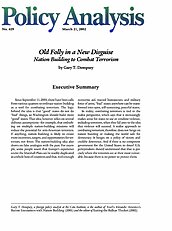Since September 11, 2001, there have been calls from various quarters to embrace nation building as a tool for combating terrorism. The logic behind the idea is that “good” states do not do “bad” things, so Washington should build more “good” states. That idea, however, relies on several dubious assumptions–for example, that embarking on multiple nation-building missions will reduce the potential for anti-American terrorism. If anything, nation building is likely to create more incentives, targets, and opportunities for terrorism, not fewer. The nation-building idea also draws on false analogies with the past. For example, some people assert that Europe’s experience under the Marshall Plan can be readily duplicated in a whole host of countries and that, with enough economic aid, trained bureaucrats, and military force of arms, “bad” states anywhere can be transformed into open, self-sustaining, peaceful states.
In reality, combating terrorism is tied to the realist perspective, which says that it increasingly makes sense for states to use or condone violence, including terrorism, when they fall prey to the idea that violence will succeed. A realist approach to combating terrorism, therefore, does not hinge on nation building or making the world safe for democracy. It hinges on a policy of victory and credible deterrence. And if there is no competent government for the United States to deter? U.S. policymakers should understand that that is precisely where the terrorists are at their most vulnerable, because there is no power to protect them.

This work is licensed under a Creative Commons Attribution-NonCommercial-ShareAlike 4.0 International License.

